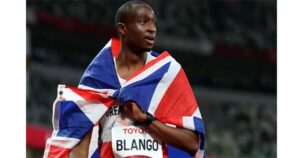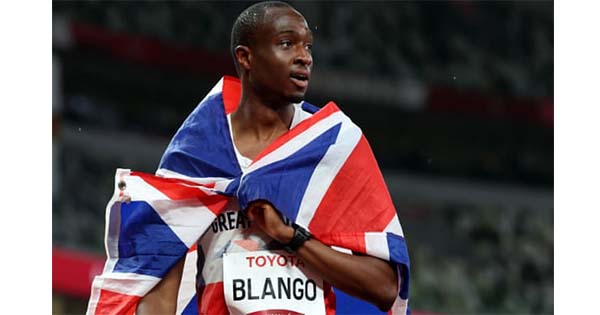
“That was hard,” Columba Blango said. The heat had broken and the rain was coming down, but in the second international competition of his career the 29-year-old from Peckham Primark had won a bronze medal.
“It’s my first Paralympic Games, so I plan to make more in future,” he said. “I can take this experience with me knowing that I’ve actually done something.”
Blango’s story is a rich one. He is the son of a former decathlete, also called Columba, who competed for Sierra Leone at the Moscow Olympics and went on to become the mayor of Southwark. Suffering blood clots on his brain at birth, Blango could not speak until the age of six. He now competes in the T20 category for athletes with intellectual impairments, but studied for a degree in tourism at Greenwich university. He also works at the fast fashion retailer to support his training and, yes, he can run a mean 400m.
He finished in a personal best of 47.81sec, two-hundredths of a second behind the French winner Charles‑Antoine Koukakou (comfortably quicker than his father’s time of 53.48 in 1980 and faster even than Daley Thompson’s 48.01 from that Games), after a storming finish down the straight took him through the pack.
It looked as if another 10m would have given him victory, but Blango was not so sure. “I don’t know. Anything can happen in the race,” he said. “All I know is I saw the people in front of me – five people, I believe – and I thought: ‘I can still catch them.’”
Blango may well have picked up some of that belief from his father, who has kept a keen eye on his son’s development. “Education has always been part of my upbringing,” he said, though he was quick to add a qualifier. “It’s a natural gift. It’s just about nurturing the gift. Growing, years and years of training has led to this.”
As for his colleagues at Primark, he was expecting WhatsApp to be pinging when he got back to the dressing room.
Blango is a new talent on the block for ParalympicsGB and his arrival came at the same time as a great departure, with David Weir competing in his last race on the track. The six-time Paralympic gold medallist still has his favoured marathon on the last day of competition, but his return to the track after a reversed retirement has been unsuccessful.
Elimination in the heats of the T54 5,000m last Saturday was followed by a last-place finish in the 1500m on Tuesday. His great rival Marcel Hug won both events, the latter in a world-record time.
“The speed has gone up a little bit but I’m pushing in an aluminium chair, others are in carbon fibre chairs and Marcel’s is on the next level,” Weir said of the Swiss athlete whose racing chair is the result of a bespoke collaboration with a series of engineering companies. “He’s a fantastic athlete and he’d have probably won in any chair but perhaps the UK needs to invest a little bit more in wheelchair racing.”
Weir said his enthusiasm for the marathon was undimmed. “I’ve done all right in the last two years, I’ve still been in the top three in the world on the circuit,” he said.
“I need to evaluate what I want to do. I might do the marathon for the Commonwealths. I won’t do the track, I’ll leave that to the faster guys. I really enjoy the marathon, the marathon circuit seems to be the next level compared to wheelchair racing.”
On a day of 12 British medals, including three gold, ParalympicsGB and Team GB announced they had crossed the milestone of 1,000 medals since the start of National Lottery funding. While Weir was bringing attention to aspects of his sport he believed still needed more focus, the ParalympicsGB chef de mission, Penny Briscoe, was full of praise for the squad and its success in Tokyo.
“We’re halfway through the Games and from our perspective we’re very, very pleased with how things are going across the team,” she said. “At this stage more sports have medalled, we’ve got more gold-medalling sports and we have more medallists than we had at a similar point in Rio. There’s still an awful lot to look forward to.”
Sign up for our Tokyo 2020 briefing with all the news, views and previews for the Paralympic Games.
Briscoe was quick to praise the relationships between coaches and athletes, believing it had proved crucial in the success of small teams such as fencing and powerlifting. This comes after 2016, when Weir said he had felt let down by one of his coaches, while several para-swimmers filed complaints of bullying against their team.
“The whole system stopped, took a breath and reflected in terms of where we were and how we wanted to proceed in terms of the culture of the UK high-performance system,” Briscoe said. “We want to make sure that the balance is right in terms of the expectations and how we work as a collaborative system to reach our goals.”
This story originally appeared on the Guardian Newspaper and is published here for educational purpose








